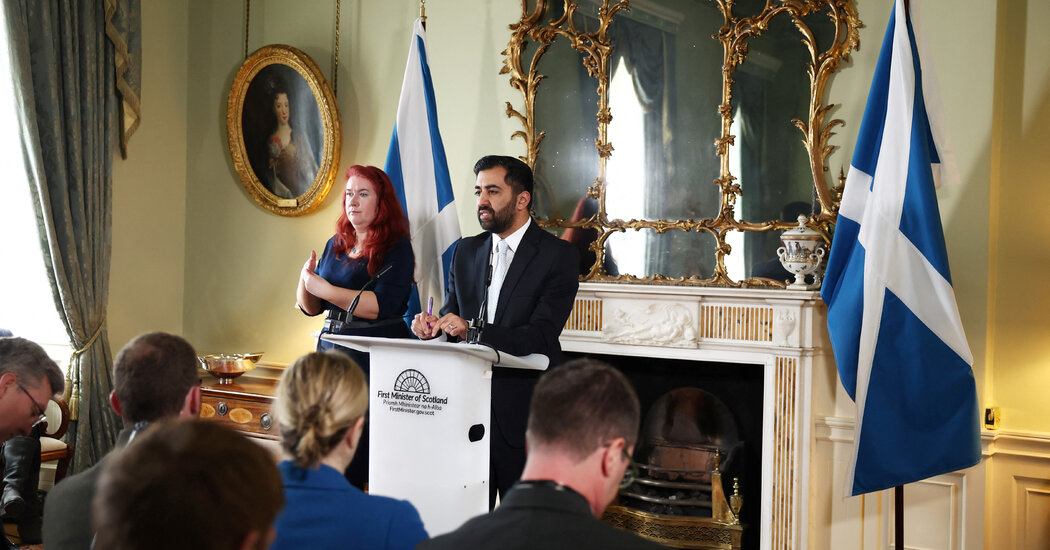
Scotland's First Minister, Humza Yousaf, resigned on Monday in the latest setback for his Scottish National Party, which has been engulfed in a slow-burn crisis over a funding scandal that erupted after his Popular leader Nicola Sturgeon resigned last year.
Yousaf's departure had looked increasingly inevitable after he gambled on a power-sharing deal with the Scottish Green Party last week, angering its leaders and leaving him at the head of a minority government with no obvious allies. His opponents then pushed for two motions of no confidence, which were due to be tabled by the end of the week.
After exploring his options over several difficult days, Yousaf, who was Scotland's first Muslim leader, said he would resign in a speech on Monday at Bute House in Edinburgh, the official residence of Scotland's first minister.
“After spending the weekend reflecting on what is best for my party, for the government and for the country I lead, I have concluded that restoring our relationship across political divides can only be done with someone else at the helm,” Yousaf said in a brief and sometimes emotional statement.
He added: “It is my intention to continue as prime minister until my successor is elected.”
His resignation came just over a year into leading the SNP, which has dominated the country's politics for more than a decade and is campaigning for Scottish independence.
Yousaf took over after the surprise resignation of Ms Sturgeon, a senior figure in British politics, who announced her departure in February last year. At the time Yousaf was seen as the candidate for continuity.
But that became less important when Ms Sturgeon's husband, Peter Murrell, was arrested and subsequently charged with misappropriating funds while he was the party's long-serving chief executive. Ms Sturgeon was also arrested in the same investigation but she has not been charged.
With the funding scandal looming over the SNP, Yousaf has struggled to establish himself as leader, and the crisis has coincided with the fading prospects for a new referendum on Scottish independence, the party's main concern. In a 2014 referendum, Scots voted to remain in the United Kingdom by a majority of 55.3%, and polls suggest that just over half of voters continue to reject independence.
The SNP's problems have been a boon to Britain's main opposition Labor Party, which once dominated Scottish politics but saw its support collapse in the mid-2010s amid growing debate over Scottish independence.
Labour's recent revival in Scotland could yield a number of seats in the general election scheduled for later this year, which would significantly ease party leader Keir Starmer's path to 10 Downing Street, the prime minister's official home British.
But the latest blow to the SNP – Yousaf's resignation – was largely self-inflicted.
The party's power-sharing deal with the Greens, signed by Sturgeon in August 2021, allowed the SNP to retain power after emerging as the largest party in that year's election but failing to gain the absolute majority.
In recent weeks the Greens had become disgruntled after the Scottish Government backed away from a pledge to reduce greenhouse gas emissions by 75% by 2030.
There was also tension between the parties over NHS Scotland's decision to suspend prescribing puberty blockers and other hormone treatments for minors. This followed an independent review of gender services in England by Hilary Cass, a paediatrician.
The Greens had planned to consult their members on whether to remain in the coalition, but last week Yousaf pre-empted that decision by terminating the agreement himself.
He appeared to take it for granted that he could continue to lead a minority government with the tacit support of the Greens, but the peremptory manner in which he struck the deal infuriated the party. When the Scottish Conservative Party forced a vote of no confidence in Yousaf, expected this week, the Greens said they would vote against him.
Labor then called for a vote of confidence in the Scottish Government, presenting two huge hurdles for Yousaf to overcome.
His failure to secure new support underlined the fractious nature of Scottish politics. He could have kept his job if he had reached a deal with Ash Regan, a former rival who left the SNP to join another pro-independence party called Alba. But Alba is led by Alex Salmond, a former first minister and SNP leader who had a spectacular falling out with Ms Sturgeon, his one-time protégé.
The prospect of a deal with Alba appeared too much for the SNP's progressive wing, which left a new form of deal with the Greens as the clearest option to save the government and avoid a premature Scottish election.
But the Greens were in no mood to forgive Yousaf. After finalizing their deal last week, Lorna Slater, co-leader of the Greens, accused the SNP of “an act of cowardice”, adding that Yousaf “could no longer be trusted”.
Mr Yousaf admitted on Monday that he had “clearly underestimated the level of pain and upset” he had caused. “For a minority government to govern effectively and efficiently, trust when working with the opposition is clearly key,” he said.
He added that he was “not willing to trade my values and principles or make deals with anyone simply to maintain power,” paid an emotional tribute to his family and noted that politics is sometimes a “brutal business.”
